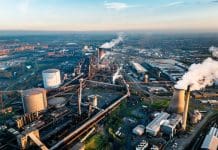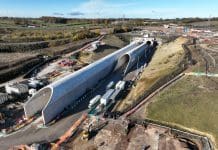PBC Today’s latest reader survey took on the thorny issue of HS2 – and the results made for some fascinating reading
Prime Minister Boris Johnson approved the decision to build the HS2 high-speed rail project in February, despite the government’s own review warning that it could cost as much as £100bn and be delivered up to five years behind schedule.
In April, the government gave the formal go-ahead for construction work to get underway, despite the current Covid-19 lockdown and with contractors required to follow social distancing rules.
HS2 minister Andrew Stephenson said: “This next step provides thousands of construction workers and businesses across the country with certainty at a time when they need it.”
According to HS2 Ltd, the company responsible for delivering the line, the project will act as an economic catalyst that will bring in over £92bn of benefits. Nevertheless, even as the first shovels prepare to hit the ground, this controversial project is still attracting criticism. The influential free-market think tank the Adam Smith Institute described the decision to approve construction as “tone-deaf” in the current circumstances, adding that with the pandemic likely to have a devastating economic impact on the UK, there is simply no room for “vanity projects” like HS2.
Transformational or waste of time?
We asked PBC Today’s readers if they believe HS2 can deliver on its promise of being a transformational infrastructure project for the whole of the UK, or if it risks becoming a white elephant. We also wanted to know what they saw as the benefits of HS2, the disadvantages, their preferred alternatives for investment and the project’s likely legacy for construction and engineering. We received over 500 responses between 20 February and 20 March.
On the big question of whether Boris Johnson was right to give the green light to the project, it was not good news for the Prime Minister. Almost two-thirds (63%) of respondents said no.
Of those, almost half (45%) felt the government should have instead shifted its focus to investing in existing rail infrastructure. Another 31% would have preferred investment in new “Northern Powerhouse” rail connections, linking east and west, rather than a new line to London.
In addition, 8% said their preferred option would have been cancellation of HS2.
Advantages of HS2
When it comes to the main advantages of HS2, respondents cited greater connectivity and faster travel speeds, as well as easing congestion through increased capacity and promoting a more sustainable form of transport.
One of those behind the project was Steve Nesbitt, chief technologist at the Manufacturing Technology Centre, who said: “Aside from the investment and economic gearing generated, a more resilient rail network will enable a step increase in capacity, which then allows a greater migration of freight from road to rail, and assist in reducing road-based congestion and emissions.”
However, many saw little, if any upside to the project, seeing the expected reduction in travel times (1h 21m to 52m from London to Birmingham, according to the Department for Transport) as too small to justify the investment required.
Disadvantages of HS2
When asked to cite the disadvantages of the project, many highlighted the environmental damage caused by constructing the new line and particularly the loss of ancient woodlands.
The Woodland Trust has described HS2 as a “grave threat” to the UK’s irreplaceable ancient woodlands, with the charity estimating that 108 are at risk of loss or damage because of the project.
As one respondent wrote: “The business case does not make economic sense. It creates environmental damage and doesn’t solve our transport issues. It is not net carbon neutral even at 120 years.”
Readers also criticised the project’s budget, the length of time it will take to complete the line, with Phase One due to become operational in 2028-2031 and Phase Two in 2035-2040, and expressed fears that rather than expanding economic activity northwards, it will only pull more talent and resources to the capital.
HS2’s legacy for construction and engineering
We also asked how HS2 will help to shape construction and engineering in the UK.
According to HS2 Ltd, the design and building of HS2 will support 30,000 jobs at the peak of construction, including at least 2,000 apprenticeships.
The project, it added, will “leave a legacy of a highly skilled and diverse workforce to address challenges faced in the wider transport infrastructure sector”.
Indeed, many of our readers believe the project will improve the image of UK infrastructure and show we can deliver a modern high-speed rail project in line with other advanced economies such as France and Japan.
In addition to improved rail infrastructure, some readers believe HS2 will support new product developments and trials, as well as upskilling for a new generation of construction workers.
Steve Nesbitt said: “It is a mechanism to force the cultural and quality focus shifts needed in UK construction, or we risk being left well behind the rest of the world.”
However, there were also plenty who saw little prospect of a positive long-term legacy from HS2.
One respondent, a construction project manager at a unitary local authority, said the project would achieve “nothing that could not be better achieved through a large number of other significant infrastructure schemes for the same overall cost”.
“HS2 is a one-off given the geographical context of the UK – nothing that is learned about engineering very high-speed rail will be of any use for other rail infrastructure projects in the UK,” they added.
Is it worth it?
Finally, we asked if HS2 is delivered by its current estimate of 2035-2040, cuts journey times as billed and costs the upper projection of £106bn, will the investment have been worthwhile.
Again, there was a clear majority, with 68% saying no and only 32% saying it would be worth it.
Over a decade since it was first proposed in 2009, HS2 remains a controversial and divisive project. It has its passionate advocates, to be sure, but as our survey indicates, there are many more who are yet to be convinced.
With the government giving the order to go ahead, we will now see if the teams working on HS2 can deliver all it promises.
PBC Today
0843 504 4560














